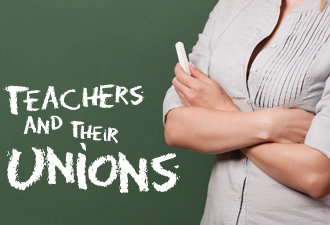Media
Pa. Teachers Unions Among America’s Most Powerful
 Pennsylvania’s teachers unions rank fourth among all U.S. states in their strength and influence, according to a report released this week from the Fordham Institute. We trail only Hawaii, Oregon and Montana.
Pennsylvania’s teachers unions rank fourth among all U.S. states in their strength and influence, according to a report released this week from the Fordham Institute. We trail only Hawaii, Oregon and Montana.
Among the factors contributing to the muscle of the Pennsylvania State Education Association (PSEA) and the Pennsylvania Federation of Teachers (PFT) are rich resources, deep political involvement and broad collective bargaining privileges. For example:
- PSEA and PFT have a wide combined membership (223,000 according to our count). According to Fordham, that translates to the 12th-highest rate of union membership in the United States, at 93.4 percent, and the 19th-highest annual revenue for state affiliates.
- Union donations made up 1.5 percent of total contributions to political candidates for state office, the 10th-highest among states.
- Collective bargaining is mandatory for public school teachers in Pennsylvania, and they are allowed to strike. In addition, bargaining is explicitly required or permitted over wages, hours, terms and conditions of employment, and management rights. State law implicitly allows for collective bargaining in 17 other areas, including tenure, layoffs, pension benefits, length of school year, and so on.
In fact, the PSEA is preparing to flex even more political muscle—once again increasing dues on teachers and other school employees. In 2012-13, a full-time public school teacher and PSEA member will pay $669 in combined dues to the PSEA and the National Education Association. That’s 21 percent higher than five years ago.
Over the past few years, the PSEA has been plowing member dues into politics. In 2007-08, the union spent $1.9 million on “political activities and lobbying,” which include election mailers, get-out-the-vote drives, independent campaign activities and lobbying of legislators. By 2011, just three years later, such spending had skyrocketed to $4.2 million—a 121 percent increase. This money doesn’t count contributions to PSEA’s political action committee, PACE, which further rakes in millions.
Despite raising union dues and spending heavily on politics, teachers unions still hang younger members out to dry in tough economic times. Hundreds of teachers have been laid off across Pennsylvania, and the first to go aren’t the worst teachers. With union seniority rules, they’re just the youngest. Take Esme Santiago, 26, who taught English as a second language in her hometown of Reading (America’s poorest city): “I was thinking about my kids. I honestly love my job. My passion is teaching kids in Reading.”
All the statistics about unchecked union influence boil down to this: Kids’ education gets hurt. Taxpayers get hurt. And even teachers like Esme get hurt, too. That’s the price Pennsylvanians pay for winning fourth place in the union power rankings.